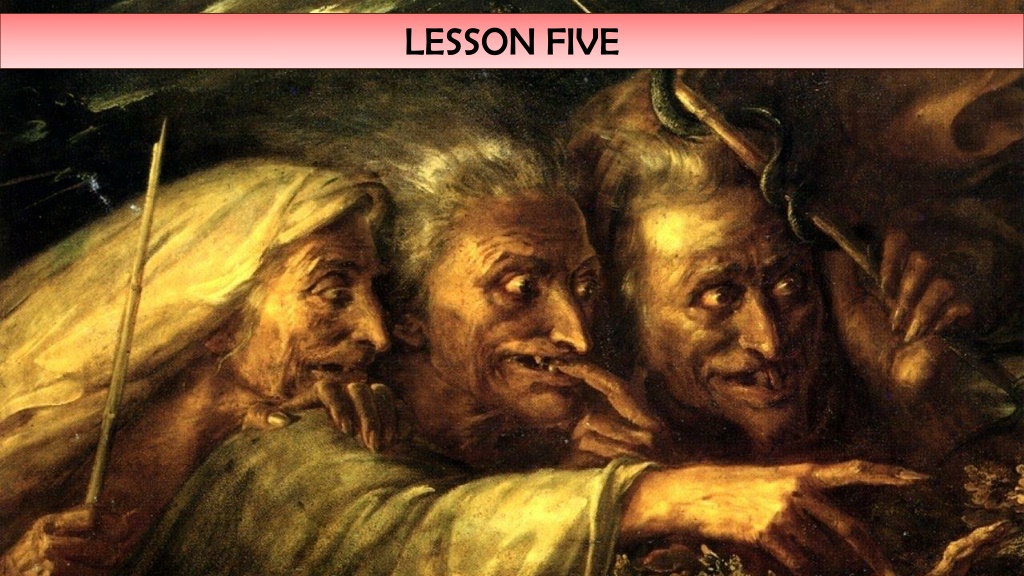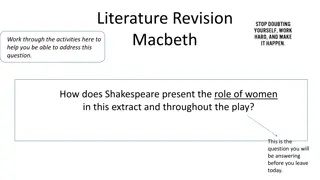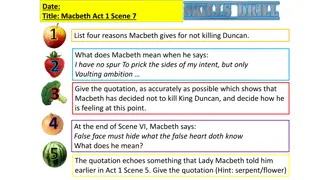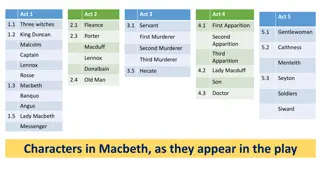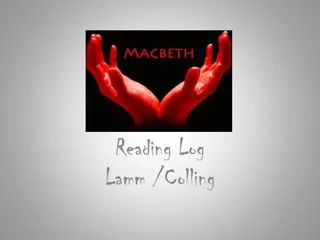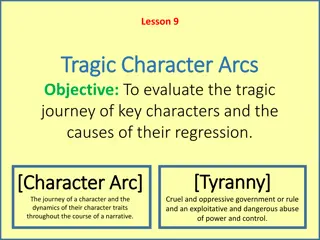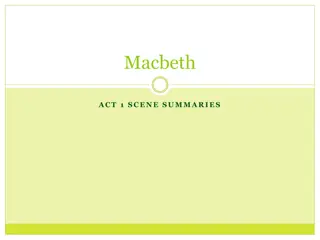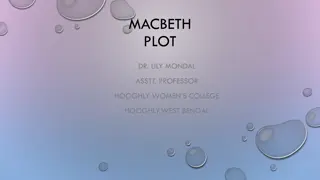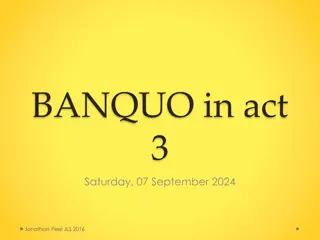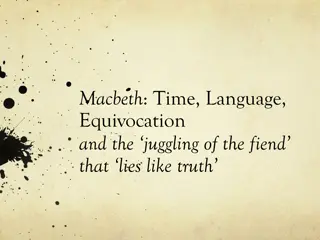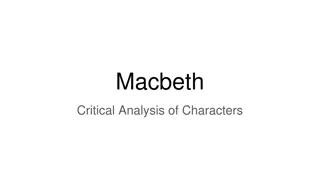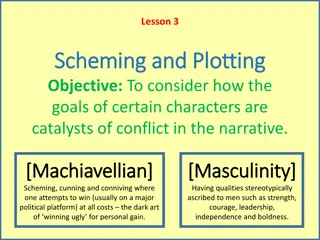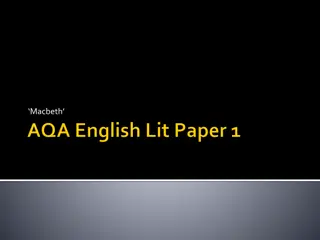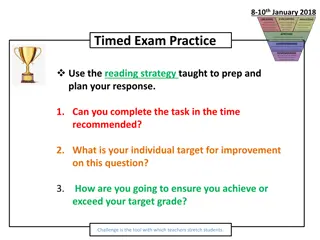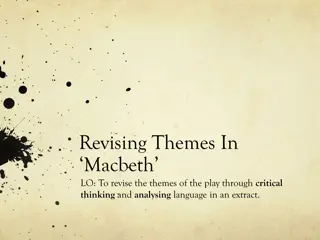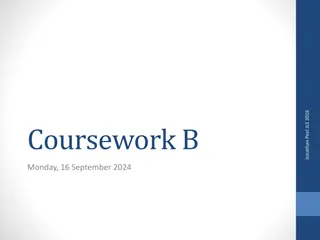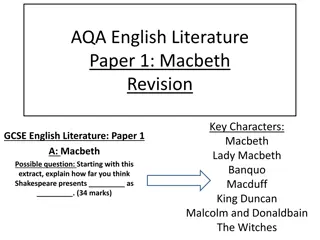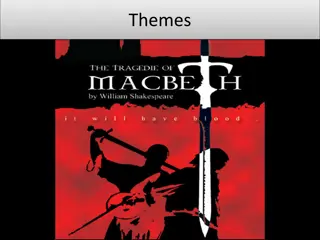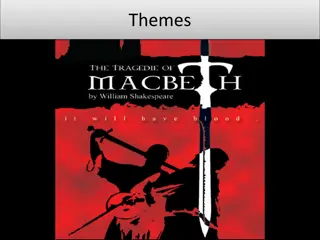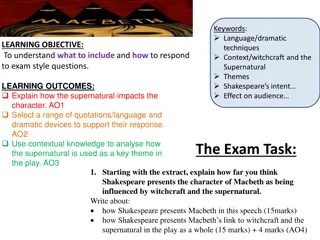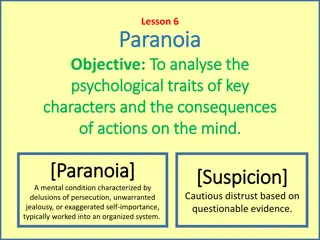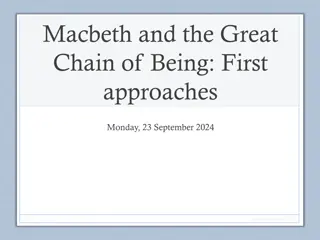Exploring Lady Macbeth's Power in Shakespeare's Macbeth
In Shakespeare's "Macbeth," Lady Macbeth is portrayed as a powerful and determined woman who challenges societal norms. Through an analysis of key quotes and themes, we delve into her character, examining how she invokes the supernatural and defies traditional gender roles to achieve her ambitions. By understanding the social and historical context of the play, we gain insights into the significance of Lady Macbeth's actions and the language used to depict her strength. Students are encouraged to engage critically with the text and explore the complexities of gender, power, and ambition in this iconic Shakespearean tragedy.
Download Presentation

Please find below an Image/Link to download the presentation.
The content on the website is provided AS IS for your information and personal use only. It may not be sold, licensed, or shared on other websites without obtaining consent from the author. Download presentation by click this link. If you encounter any issues during the download, it is possible that the publisher has removed the file from their server.
E N D
Presentation Transcript
YOUR TASK Starting with this speech, explore how Shakespeare presents Lady Macbeth as a powerful woman. Yet I do fear they nature; it is too full o th milk of human kindness Come you spirits that tend on mortal thoughts, unsex me here Hie thee hither, That I may pour my spirits in thine ear Come to my woman s breasts, and take my milk for gall TODAY S KEY QUESTIONS: Can I read, understand and respond to texts? 1. 2. Can I consider the social and historical context of Macbeth and discuss its significance? 3. Can I analyse the language in a scene and explain its significance?
Starting with this speech, explore how Shakespeare presents Lady Macbeth as a powerful woman. Statement (AO1) Quotation(AO1) ANALYSIS/SUBJECT TERMINOLOGY (AO2) Develop: SOCIAL/HISTORICAL CONTEXT (AO3) In Jacobean society, people believed that the supernatural existed. Due to religious beliefs, anything supernatural was seen as the work of the devil which meant audiences would be Lady Macbeth calls upon the supernatural to help her achieve her aims. Come you spirits that tend on mortal thoughts The noun, suggests The imperative, implies Lady Macbeth is willing to sacrifice her femininity and maternal instincts to help her reach her ambitions. Lady Macbeth challenges conventions and criticises her husband s masculinity. Lady Macbeth demonstrates extreme determination to get what she wants.
1) Make a point that answers the question. Shakespeare presents Lady Macbeth as a powerful and determined woman, particularly when she YOUR TASK Starting with this speech, explore how Shakespeare presents Lady Macbeth as a powerful woman. 2) Find a quotation that helps answer the question and make an inference/discuss it. In her soliloquy, Lady Macbeth says, We can infer from this that 3) Analyse the quotation. What does it suggest? What effect does the language have? Use the correct subject terminology. The verb/noun/adjective/imperative, could imply Shakespeare may have Lady Macbeth say this because he wanted a contemporary audience to feel Furthermore Yet I do fear they nature; it is too full o th milk of human kindness Come you spirits that tend on mortal thoughts, unsex me here Hie thee hither, That I may pour my spirits in thine ear Come to my woman s breasts, and take my milk for gall 4) Relate to the social/historical context. It is interesting to note that Shakespeare uses masculine imagery to help present Lady Macbeth as a powerful woman. Lady Macbeth clearly realises that to get anywhere in life she must TODAY S KEY QUESTIONS: Can I read, understand and respond to texts? 5) Make your next point, talking about another part of the play. Repeat the process! Lady Macbeth is further presented as powerful through 1. 2. Can I consider the social and historical context of Macbeth and discuss its significance? 3. Can I analyse the language in a scene and explain its significance?
YOUR TASK Stick the grid underneath your work. Reflect on your work and tick the box you think is most appropriate for your work. TODAY S KEY QUESTIONS: Can I read, understand and respond to texts? 1. 2. Can I consider the social and historical context of Macbeth and discuss its significance? 3. Can I analyse the language in a scene and explain its significance?
1) Make a statement that answers the question. Shakespeare presents Lady Macbeth as a powerful and determined woman, particularly when she 1) Make a statement that answers the question. Shakespeare presents Lady Macbeth as a powerful and determined woman, particularly when she 2) Find a quotation that helps answer the question and make an inference/discuss it. In her soliloquy, Lady Macbeth says, We can infer from this that 2) Find a quotation that helps answer the question and make an inference/discuss it. In her soliloquy, Lady Macbeth says, We can infer from this that 3) Analyse the quotation. What does it suggest? What effect does the language have? Use the correct subject terminology. The verb/noun/adjective/imperative, could imply Shakespeare may have Lady Macbeth say this because he wanted a contemporary audience to feel Furthermore 3) Analyse the quotation. What does it suggest? What effect does the language have? Use the correct subject terminology. The verb/noun/adjective/imperative, could imply Shakespeare may have Lady Macbeth say this because he wanted a contemporary audience to feel Furthermore 4) Relate to the social/historical context. It is interesting to note that Shakespeare uses masculine imagery to help present Lady Macbeth as a powerful woman. Lady Macbeth clearly realises that to get anywhere in life she must 4) Relate to the social/historical context. It is interesting to note that Shakespeare uses masculine imagery to help present Lady Macbeth as a powerful woman. Lady Macbeth clearly realises that to get anywhere in life she must 5) Make your next point, talking about another part of the play. Repeat the process! Lady Macbeth is further presented as powerful through 5) Make your next point, talking about another part of the play. Repeat the process! Lady Macbeth is further presented as powerful through
